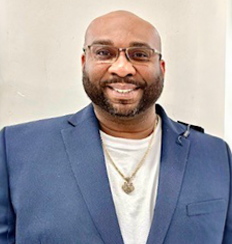Jason Samuel is a community activist passionate about supporting and mentoring youth through restorative justice.
It's a far cry from where he was in 1997: a teenage gang member who shot San Francisco Police Department Officer Thomas Morgan in the neck and left him for dead. Samuel was convicted of that crime and sentenced to life in prison. He credits the man he is today to his internal drive to be a better person—and to the restorative justice program at San Quentin State Prison in California. Restorative Justice programs inside prisons typically emphasize the importance of working with prisoners and their victims in a way that promotes healing and encourages reconciliation while also holding prisoners directly accountable to the people whom they have violated.
"Prison gave me the attention I needed to learn and grow. The teachers kept passing me along from grade to grade, even though I didn't know how to read or write. In prison, I got the instruction I needed to learn how to read and write. Eventually, I was able to get my GED. As I was learning and growing, the more I wanted to continue to change and grow, and I wanted to heal," Samuel said.
Restoring Humanity
The desire to grow and heal led Samuel to participate in Victim Offender Dialogue (VOD), a restorative justice process through which a victim of a crime (or surviving family member) and the person who committed the crime meet face-to-face in a safe, secure setting. The facilitated VOD process can provide a pathway to further healing and justice. During the VOD process, there is an opportunity for the victim and the offender to engage in open and facilitated communication to address the harm caused, understand the offense's impact, and find ways to promote healing and resolution.
Samuel took part in this dialogue after Officer Morgan made the request. By the time the in-person conversation occurred, Samuel had spent 17 years behind bars. He wanted to use the opportunity to apologize and share his personal growth with his victim. Officer Morgan told him he was proud of him for working to become a better person.
"Just because you did something bad doesn't mean that you should be punished for the rest of your life and that you are unredeemable for what you've done. Restorative justice restores our humanity." — Jason Samuel
Redemption
Samuel was released on parole in 2019—the same year the Bureau of Justice Assistance launched the National Center on Restorative Justice (NCORJ) to educate and train the next generation of justice leaders. In addition to restorative justice education and training, the NCORJ supports and leads research focused on restorative justice and addressing social inequities to improve criminal justice policy and practice in the United States. Samuel has worked with NCORJ as a speaker and trainer since his release. He is also a recipient of an NCORJ scholarship to pursue a Professional Certificate in Restorative Justice.
Samuel has also developed a close relationship with Officer Morgan, and the two men share their story of healing through speaking engagements.
"We speak at colleges and high schools, mostly here in the Bay, but I want to expand it in different cities and areas because I know our story could change people's lives and the directions they're going in," Samuel said.
To learn more about the benefits of restorative justice and opportunities for restorative justice education, including scholarships, trainings, coaching and events, visit NCORJ.
Have a story to tell? Let us know.


